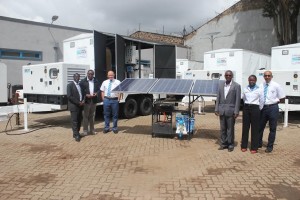
Davis and Shirtliff has partnered with the Athi Water Services Board (AWSB) on a Sh46m project to equip the water services provider with 16 mobile ccontainerizedwater treatment units.
The partnership according to the two companies is to help meet the need for innovative and robust solutions to emergency situations, such as drought and flooding, which are characterized by diminished access to clean, safe drinking water.
The increasing unreliability of rainfall in Kenya has meant that residents of counties where water access is below the national average of 48.5 per cent – as per the Kenya Institute for Public Policy Research and Analysis (KIPPRA) report – have to go for longer distances in search of water from sources whose safety is often not assured. In the event of heavy flooding, the destruction of infrastructure vital for water supply and the contamination of the supply leaves residents prone to outbreaks of water diseases, such as cholera, which are especially fatal in informal settlements where levels of sanitation are low.
“One of the major challenges that we face in our jurisdiction is ensuring access to clean and safe water during adverse weather conditions, such as short heavy rains and prolonged droughts, arising from climate variability. In order to plug the gap in supply, we have had to source for alternatives to the traditional sources of water which have become unreliable,” said Eng. John Muiruri, Chief Manager, Capital Planning and Engineering Services at AWSB.
The solution to this challenge came from Davis and Shirtliff who following a competitive bidding process was awarded the contract that saw the equipment manufacturer deliver cost-effective and highly mobile water treatment units able to process virtually any kind of polluted raw water and turn it into clean drinking water through the use of reverse osmosis and ultrafiltration technologies.
“Within a very short period, the equipment can be assembled for use even in the most remote of locations to treat either saline, turbid or highly mineralized water. With the solar and diesel electric generators options provided with the mobile water treatment units, sophisticated electricity provision will not hamper water provision efforts,” said Alec Davis, CEO of Davis and Shirtliff.
This incorporation of alternative power sources for the water mobile water treatment units was in response to the concern by AWSB that numerous boreholes become idle due to the high cost of pumping water by electricity.
Of the 16 mobile containerized water treatment units supplied to by Davis and Shirtliff, 10 run on solar and are rated to produce 600 litres of clean drinking water in an hour and are best suited for communities in rural areas due to its portability. The remaining six are operated by diesel generators that recharge a battery bank for alternate use and produce clean drinking water at a rate of 5,000 litres per hour to larger communities.
As the provision of basic services is under the management of county governments, AWSB will hand over the mobile water treatment units to governors in its areas of jurisdiction, which include Kajiado, Machakos, Kitui, Makueni, Nairobi and Kiambu, and will be in operation before the end of the year.
“Providing Kenyans access to clean and safe water is now a function of devolved governments. As a water services provider, on this occasion we step in to build the capacity of the county governments to integrate innovation in water solutions,” said Eng. John Muiruri.
Through the mobile water treatment units, AWSB will provide Kenyans with clean and safe drinking water at a cost of not more than two shillings for 20 litres. This is however expected to be different in informal settlements, where the service will be priced at a slightly lower rate than prevailing rates so as to protect the livelihoods of existing water vendors.
The project will be integrated into the government’s climate resilient water structures programme, which includes water pans and storage dams in drought prone areas. With the AWSB estimating the average water need per person at 70 litres a day, each unit will be able to serve at between 100 and 850 people a day, based on its capacity.
Regionally pioneered by Davis and Shirtliff, the mobile containerized water treatment units have previously been supplied to the Rwanda National police and Rwanda Defense Forces for use in military operations in Mali and Congo, and to the United Nations for operations in South Sudan.
Davis and Shirtliff is able to customize these units to match capacity and powering needs. The water treatment equipment is containerized in strong, weatherproof and rust free enclosures and mounted onto trailers for ease of mobility. The firm also provides training on operation and maintenance of the units as well as repair and regular servicing to ensure optimum performance of the mobile water treatment units.
Davis and Shirtliff Limited is a Kenyan multinational, operating through a network of Kenyan branches and regional subsidiaries in Uganda, Tanzania, Zambia, Rwanda, Ethiopia, South Sudan, Somalia, Burundi and DRC. Founded in Kenya in 1946, it is the leading supplier of water related and alternative energy equipment in East Africa.





